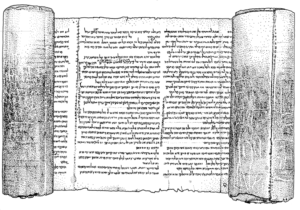CAN WE TRUST THE BIBLE?
AND IS THIS THE RIGHT QUESTION?
Can we trust the Bible?
It seems a fairly straightforward question. After all, Christians claim that the Bible is the Word of God, so it should be reliable. If it is not reliable, then maybe it is not the Word of God. A lot hangs on this simple question.
However, it is not the right question. It arises from a simple problem of grammar. In English, and in fact in all languages other than the original, the Bible is simply “The Book”, with different parts and chapters. But in the original language, Greek, this is not so. The Greek for “the Bible” is actually “ta Biblia” or “The Books”, plural. This recognises that the fact that there are 66 different books in the Bible, and some of these should probably be divided into more books themselves, (e.g. Isaiah and 2 Corinthians). And before the Christian church came along, there was not the techn
ology to put all the writings in a single book. Each individual book of the Bible had to have its own separate scroll. Apart from the twelve short prophetic books at the end of the Old Testament, which had their own special scroll, “The Twelve”. So, if the Bible is made up of many different books by many different authors, writing over a period of more than a thousand years, we are faced with the possibility that some writers might be more reliable than others.
The first question is why the Bible includes just the books it does and not others. How were the various Bible books assembled into the volume we have today?
THE LAW AND THE PROPHETS
The first division about the Bible was between Jews and Samaritans. (The Samaritans were the inhabitants of the former northern kingdom of Israel, resettled by Assyria after that empire had destroyed it in 622 B.C.E.) By the 5th century B.C.E. Samaritans held only the first five books as authoritative, i.e. Genesis, Exodus, Numbers, Leviticus and Deuteronomy, called collectively the Torah or Law. Jews held them in equal veneration, but added the historical books and prophets as key to their spiritual life. That is why Jesus never spoke of “the Old Testament”, but used the phrase, “the law and the prophets”. From about 200 B.C.E. a number of books, written in Greek, were highly regarded. In the 1st and 2nd centuries after Christ, the rabbis excluded these, but the Church kept using them, right up to the time of the Reformation when they were put in a separate section called the Apocrypha (hidden things) and slightly downgraded. The normal Old Testament, i.e. Hebrew books, make up about 960 two-column pages.
THE GOSPELS
When I was a child, a simple night time prayer was,
“Matthew, Mark, Luke and John, bless the bed that I lie on.”
These are the four gospels (the word means good news) on which the Church bases its knowledge of Jesus. By 200 A.D these were the recognised gospels, along with most of the rest of the New Testament. Fixing what books could be relied on became very important to the early Church. The reason why the early Church adopted these four is that they believed they could confidently be traced back to the earliest apostles. They make up about 100 pages.
While the Church grew, so did various Gnostic sects. “Gnosis”refers to the special knowledge by which the initiates could be sure of getting into heaven. In the second century every self-respecting heretic would create a new gospel and give it the name of some famous apostle. There were many “gospels” circulating, using the names of apostles to promote a world-denying super-spiritual religion. It is easy to get hold of them, they are in print.
THE REST OF THE NEW TESTAMENT
The Acts of the Apostles gives the history of the first church in Jerusalem and then concentrates on the missionary journeys of St Paul. (36 pages)
Then come 13 letters of St Paul (though some smaller ones are disputed) (70 pages)
Letters from other apostles (30 pages)
Revelation (20 pages)
The criteria by which the early Church determined what should be included and what excluded was, were they by the original apostles?
IMPORTANT QUESTIONS
So – can we trust all these 1200 pages? That is an impossible question to answer. We have to look a bit more carefully at each book, with questions in our minds like: How near to the original events were they written? Who wrote them? Did they have an agenda? Can we cross-reference to other passages in the Bible, or to sources outside the Bible? Can archaeology give some light?
THE PROGRAMME
Over the next few months, I will be considering the various books of the Bible on a case-by-case basis, starting with the Gospels and the cases of Mark, then Luke, then Matthew, then John. My facebook page “RevAndyBooks” will flag up when the next blog will come out.

